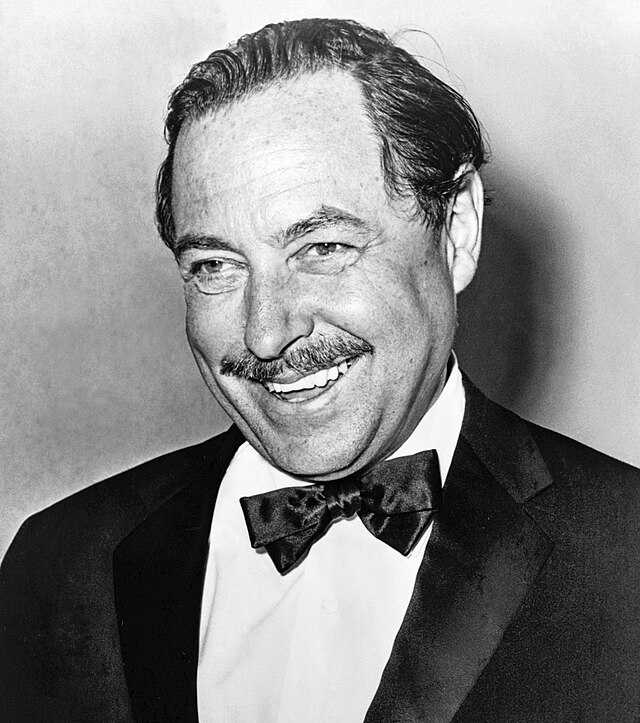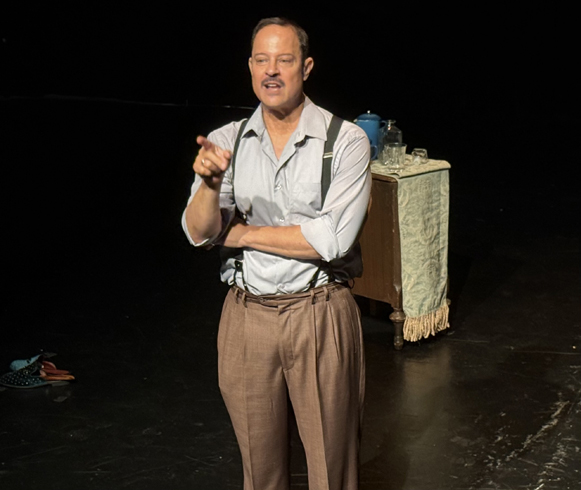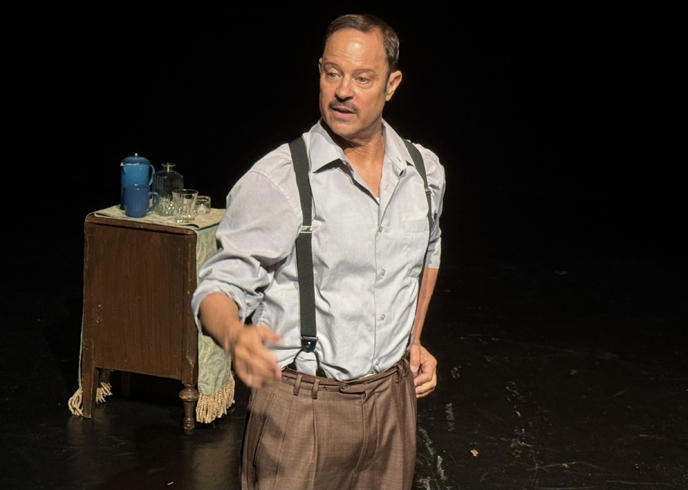By Alix Cohen
“My goal is to capture the evanescent quality of existence.” Tennessee Williams
Tennessee Williams (Thomas Lanier Williams III 1911- 1983) was one of the most influential American playwrights of the 20th century. Known for his lyrical style and emotionally charged characters, he captured the fragility of human desire and the tensions of Southern life with haunting precision.
Williams won two Pulitzer Prizes and helped redefine American theater with his psychologically complex, often controversial work, especially superb portraits of women. Despite personal struggles with addiction and mental health, his legacy remains towering.

(Public Domain)
This is a one man play with a few evocative black and white photos of location, intimates, and chapter headings shown on screen. Set is minimal, costumes just right. ‘Love the velvet slippers. We meet in the nineteen-fifties. Williams is typing. “Shall I entertain you with my theAta (theater) or my life?” Out Cry is being produced in New Haven, critical response limp. He’s been asked to speak. “Y’all seem to be resistant to the kind of theAta I want to practice,” he says.
At this point, the actor steps out of character to explain what he’s going to do…that there’s a reason the stage is dimly lit, that he’ll play other characters. It’s totally unnecessary.
When he was five, Williams nearly died from diphtheria, which left him frail and confined to his home for nearly a year. During this period of isolation, he turned inward, developing a vivid imagination and a love for storytelling. His mother gave him a typewriter at 12, and he began writing in earnest not long after. (This rises out of sequence and with less importance that it might.)
We start with Chapter 4: Early life in California. Williams hocked his possessions and had to go to the street to bum a cigarette. He worked as a feather picker on a squab ranch. Description is colorful. My research shows him moving to the state as an MGM writer which must’ve been years later.
Chapter 5: The Glass Menagerie. Anecdotes about production challenges continue the memoir’s human perspective. In Williams’ eyes, Laurette Taylor’s Amanda Wingfield saved the play. He takes (a first?) pill during post closure depression. A Rockefeller Grant makes him viable. Agent Audrey Wood takes him on- for the next 32 years.

Important works provide intermittent framing. Simone-Friedland briefly plays roles in The Glass Menagerie, A Streetcar Named Desire, The Rose Tattoo… All are effective in tone, but acted just a little too big. (Brando might successfully be eliminated.) Small Craft Warnings, Cat On a Hot Tin Roof, Baby Doll, Night of the Iguana, The Milk Train Doesn’t Stop Here Anymore– “more dramatic off stage than on,” are recalled. One forgets how prolific he was. Williams talks about early success and being conscious of providing “good copy” in interviews.
Several important lovers are noted. Pancho Rodriguez—the inspiration for Stanley Kowalski in A Streetcar Named Desire—nicknamed Sancho, and Frank Merlo (a 15 year relationship) are predominant. One gets a good sense of his attraction to unstable men and his open sex life. When Jack Warner asked Merlo what he did, the young man responded “I sleep with Tennessee.”
Williams begins to wash Seconal down with martinis. We never see him drunk. Addiction is downplayed. Is this editing or was he in denial? There, is, however, an unabashed story of the writer’s breakdown and incarceration after Frank’s death. Speaking of the loss, the actor’s voice effectively halts and almost chokes. He’s moving.
Friendships with author Carson McCullers (author of A Member of The Wedding) and Irene Mayer Selznick who produced A Street Car Named Desire, yet rejected The Rose Tattoo as too operatic, interaction with director Elia Kazan, a first meeting with Marlon Brando, and housemates at Key West are conjured.

Performance is fluid, stage business more or less realistic as represented by an unsettled man with a glass in his hand and pills in his pocket. Pacing is organic. Adaptation (Steven Simone-Friedland) touches on salient periods, offers personality, and selects telling anecdotes. It’s a pointedly gentle perspective.
Actor Rick Simone-Friedland is consistently sympathetic. He inhabits Williams’ softly cadenced Mississippi accent. The actor effectively looks AT audience faces, connecting. Stage ease is appealing.
Photos courtesy of the production
Kind Stranger- A Memory Play
Based on Tennessee Williams’ Memoirs
Adapted and Directed by Steven Simone-Friedland
Conceived and Performed by Emmy® Award Winner Rick Simone-Friedland
August 29, September 1, September 3
Theater for the New City 155 First Avenue
Tickets: Tickets https://ci.ovationtix.com/35441/production/1245043
Part of Dream Up Festival 2025
https://www.dreamupfestival.org/index.html


